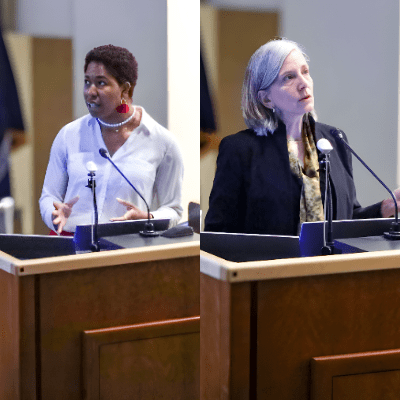
Pennington Biomedical Research Center hosted Michele Allen, M.D., and Kene Orakwue, MPH for the Forge AHEAD April seminar where they presented on their innovative approaches to combatting health disparities, building on a framework that acknowledges the deep impact that racism has on health outcomes.
Allen, associate professor at the University of Minnesota Medical School and MPI for the C2DREAM Center, provided an in-depth overview of the center’s objectives and methods, emphasizing their proactive stance against racism in health research.
She noted, “We are striving to advance this field… We have significant partnerships with indigenous groups, reflecting our commitment to anti-colonial perspectives and the parallels among indigenous, Black, and immigrant communities.” This underscores the center’s dedication to inclusivity and diversity in health research, acknowledging various dimensions of racism and colonial impacts.
Allen further emphasized the critical need for incorporating a framework that considers racism in health research, stating, “To dismantle racism, we must understand how it functions and manifests, not only within communities but also within our research endeavors.
It is essential for health equity researchers to consider racism both as a social determinant of health and in how it influences our research methodologies.” This serves as a crucial reminder of the systemic nature of racism and its extensive impact on health disparities.
Structural racism and its impact on health outcomes
Orakwue, doctoral student at the University of Minnesota Twin Cities, enhanced the dialogue by introducing a detailed framework demonstrating how structural racism affects health outcomes. Orakwue stressed the need for a structural analysis of racism, stating, “It’s crucial to consider racism at a structural level, as health inequities often emerge not just from momentary snapshots but from longstanding systemic issues.” This insight is vital for understanding the prolonged and systemic nature of health disparities driven by racism.
Orakwue also highlighted the complexity of racism, adding, “Racism manifests in various forms; it upholds white supremacy and different oppressive systems, depending on the targeted population… How do we start to address these multifaceted issues?” Her discussion points to the need for a comprehensive approach to tackle racism effectively.
Concluding insights
In her concluding remarks, Allen emphasized the significance of these discussions and frameworks in progressing the battle against health disparities. She affirmed, “This work is foundational to our operations and essential for our continuous efforts to effectively address racial inequities in health. We must persistently refine our understanding and methodologies to ensure our research and interventions are both effective and equitable.”
Facilitating ongoing dialogues on health inequity
These insights from C2DREAM resonate deeply with Forge AHEAD’s mission to challenge health inequities through informed and inclusive research methodologies. By sharing and deliberating on these strategies, Forge AHEAD seeks to deepen the community’s understanding of and engagement with these critical issues.
Engage and discover more
Forge AHEAD invites the community to participate in the upcoming fall seminar series, designed to further explore these and similar themes. This series provides a platform for community members, researchers, and policymakers to actively engage with the challenges and progress in addressing health disparities influenced by systemic racism. We also encourage viewing the recap of our seminar presentations to gain additional insights into how these discussions are evolving and influencing our approach to health equity.
Forge AHEAD is dedicated not only to discussing these issues but also to implementing practical and impactful strategies that address them at the systemic level, ensuring a healthier future for all communities. Join us in this pivotal conversation and be part of the change.
View the recording of the May seminar.